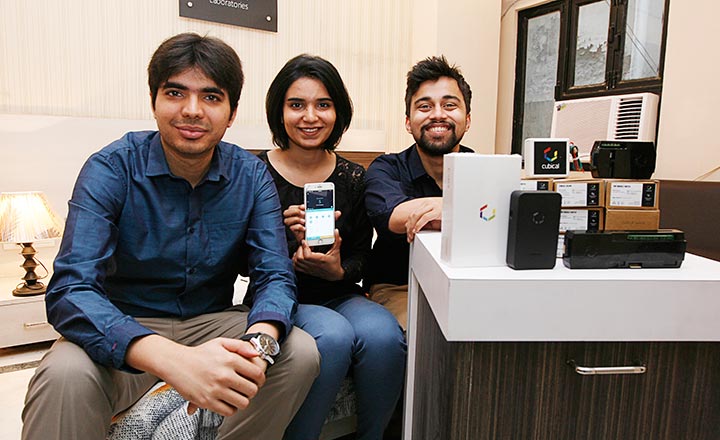Three enthusiastic college students and their college project on wireless devices — that’s how the story of Cubical Labs began. Year — 2013. Place — IIT Guwahati. Swati Vyas, Dhruv Ratra and Rahul Bhatnagar were exploring how devices can interact with each other through a wireless connection. During the course of the project, the students realised that despite almost everything under the sun that could be done with a click of a button — from opening your car door to doing your daily shopping — there wasn’t an affordable technology that had been introduced in middle class Indian homes to control electrical devices remotely. The trio immediately saw the possibility of their project becoming commercially viable. Encouraged by the faculty, the idea was incubated at IIT-Guwahati’s technology incubation centre.
Four years down the line, the team has since shifted base from Guwahati to Delhi. The company has developed a wireless home automation system, named Cubical Automation, which is currently active in over 1,500 homes across the country. What’s more, Cubical has bookings for around 10,000 more units. After introducing devices that can control electrical equipment in homes using a smart phone app, the start-up is about to launch its next product — Cubical Aura. It is an intelligence system which learns about your daily usage patterns (of ACs and fans) through real-time data, senses the outside temperature and accordingly provides suggestions to control the temperature in the rooms, besides letting you control the lighting and switching off devices using hand gestures. As increasing number of people choose to live in smarter homes, Cubical Labs is well poised to make a niche for itself in the home automation space with its suite of products.
Slow and steady
Right from the beginning, the founders were clear about what they should be developing — affordable and reliable technology to automate middle class Indian homes. Wireless prototypes were developed initially and after almost two-and-a-half years of product development, Cubical Labs introduced their first set of products in January 2016.
“Not just a basic switch on and off, but also dimming lights, scheduling, creating themes — all these can be taken care of by these devices and they can be controlled from anywhere in the world using the smart phone app,” notes Vyas, CEO at Cubical Labs. “It just takes a few hours to install the system and costs Rs.60-70,000 for a three-bedroom house,” she adds.

After taking care of the basic controls, the next aim was to provide security and analytics. The product was improvised to make wireless IP camera feed available on the phone. Basic analytics on the energy consumed by the controlled Cubical system is also provided.
Vyas elaborates a bit on the devices. “These are called Cubical switches. They go behind the switchboard, get connected to a few wires and communicate to the central hub of the home which is the Cubical master. The master communicates to the app through a wireless connection. For a 3BHK, the basic devices can control important equipments such as an AC, the heavy load devices of each room and a switch board which has lighting, fans etc,” she says. According to the founders, 30-50 devices can be connected to the master.
The sales thus far have been driven mostly by customers from cities such as Delhi, Mumbai and Bengaluru. “There are upcoming real estate projects which are completely automated. Once these projects are completed, the numbers will increase further,” says a hopeful Vyas.
The start-up which counts builders such as Mantri, Antriksh, and Omaxe currently has over 50 channel partners across 26 Indian cities. The distributors are initially required to make an inventory commitment depending on the local market size before they are given an exclusive distributorship.
But would a start-up be able to survive the competition from big and established brands such as Schneider or Honeywell in the same space? The Cubical team believes so. The founders say that the Cubical system comes at a price at least 3-4x lesser than that of the major ones. Basic automation of a house using products of premium brands usually costs Rs.3-5 lakh. In a price-conscious market like India, that could be a major differentiator.
Vyas believes there are three crucial points that could help them win the race. First, the Cubical package is a completely retrofit solution that can be installed in any home without any particular type of wiring. The bigger brands need their own switch boards and wiring right from the beginning. Secondly, Cubical has its own proprietary technology; which means it doesn’t have to pay companies such as Zigbee to use its wireless internet protocol. The third is after-sales services. Cubical’s solution offers a one-year guarantee and any complaints are met with a product replacement. The customer can call the company directly and distributors are required to have a trained maintenance team. It also helps that Cubical’s products are developed for Indian conditions where electricity supply is erratic compared with products of bigger brands better suited for the US or Europe.
The company has its own patented communication protocol which is more suitable for the Indian market because it consumes less data and can be integrated with other protocols. They are now working on incorporating voice recognition. When products such as Amazon’s Echo is launched in India, it can be integrated with Cubical products.
The team is also working on next generation products to enhance the security of homes. “All our security protocols are well protected. We are coming with a next generation cubical master to prevent theft. This came after the thought, ‘What if a thief breaks in and disconnects your electricity and internet connection?’ We have motion sensors, door locks and sensors which can be connected to the Cubical Master which will have eight hours of battery backup and its own internet system. It should be out in six to seven months,” says Ratra, co-founder at Cubical Labs.
Growth story
Cubical estimates its total addressable market at $10 billion in the coming years. “We launched the product only in January 2016 and till date have clocked around a million dollars in revenue,” says Ratra. With over 10,000 bookings in the pipeline, the company hopes to clock revenues of around Rs.25 crore in the next year.
The company, which started off with a loan of Rs.25 lakh from IIT Guwahati technology incubation centre in FY13-14, has received seed funding of around Rs.1 crore in 2015 from a consortium of investors including Indus Ventures, Sanjay Chandel, and Jayant Bhatnagar among others. The infusion was followed by another one in December 2016, which saw the entry of prominent investors such as Sonali Thapar from Thapar group, Vistar Estate, Bobby Chandhoke of Luthra and Luthra and Indo Nippon Foods among others.
“The funds are mainly being used for expansion. We just turned profitable in February. All our profits will go into product development,” Ratra says. The start-up, which manufactures first 100 of every device in-house to test out any initial chinks in the products, outsources the remaining production. “The design is fully conceptualised in-house. However, mass production is outsourced to few vendors. Having two-three vendors makes negotiation and quality control easier,” he adds.
Sonali Thapar, who is part of Indian Angel Network and has invested in the start-up, is confident that the team would have an advantage over others being one of the early players. “Their performance and growth in the last six months has really validated my expectations from the start-up. The market holds huge potential. With the government pushing for housing for all, the developers are fighting to get a big piece of the pie. So, they need technology to differentiate themselves and that’s where Cubical comes in, with its whole range of products,” says Thapar. The quality of the product and the performance of the team over the past few months has convinced Thapar that they have an edge over the competition. “Within a very short time they have been able to grab a lot of attention and have managed to expand their reach,” she notes.
Next level
While it started off with automating homes, the company is setting its sights further. It was a contract they won from Hyatt in New Delhi that opened their eyes to a new market segment — hospitality. Spurred by the initial success with Hyatt, the company is currently in talks with more high-end hotels.
It’s the same devices inside the hotel rooms, but we have developed another set of devices for the hotel ventilation and AC systems. That is the one that brings in a lot of energy savings for hotels,” says Vyas. The guests, while checking in at a hotel, will receive a tablet with which they can control the ambience on top of requesting other hotel services. However, the founders did not disclose their pricing for hotel automation.The next arrow in the start-up’s quiver is an intelligent system called Cubical Aura. “It takes in real-time data about your home’s humidity, temperature, lighting, ambience and is already available for pre-orders,” says Vyas.
Aura, which comes with multiple sensors such as temperature sensor, humidity sensor, gesture sensors, light sensors etc, also has infrared (IR) blaster which can mimic and, thus, limit the number of IR remotes at home. Once Aura is installed, through the cubical app, functions such as controlling the AC temperature or changing the TV channel, which currently require IR remotes, can even be performed by hand gestures. “You need the phone and multiple IR remotes for the earlier product. You still needed your phone to do things. We thought this could be made better,” elaborates Ratra.
The trial version of Aura was made available for Rs.8,500 but the company is yet to finalise the price. They are now in the trial period after getting around 1,000 pre-orders. “It was more than what we could fulfill. It has been really exciting to see the kind of response that Aura has received. It is just the beginning for us,” says Ratra. With IoT becoming a trend, Cubical Labs seems to be in the right place with the right products.












 Just one email a week
Just one email a week